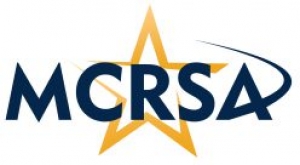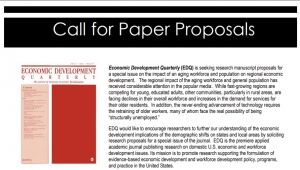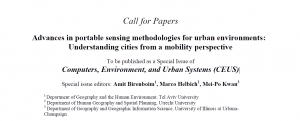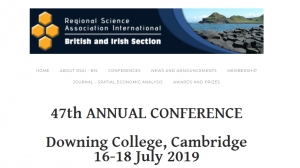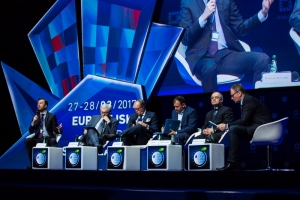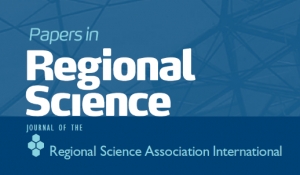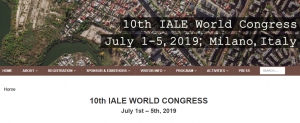Council
Elisabete Martins
Open competition for Research Scientists in economics on regional policy analysis at IRSTEA – Clermont-Ferrand, France
Open competition for Research Scientists in economics on regional policy analysis at IRSTEA – Clermont-Ferrand, France
IRSTEA (French Research Institute of Science and Technology for Environment and Agriculture) is opening a recruitment for economic researchers which will develop activities in the TERRITOIRES joint research unit (JRS) of Clermont-Ferrand (France) on regional policy analysis
The recruitment campaign is generally aimed at young researchers who have recently obtained their PhD. Candidates are recruited on the basis of their scientific competence which they will put to the service of “Territoires JRS” major research axes by responding to a research topic. Candidates must have published articles on the results of their PhD
Applicant profile:
- · PhD or equivalent
- · Specialisation in regional economics
- · Initial training in the fields of regional/rural policies and spatial econometrics
- · Good fieldwork skills are also recommended
- · Candidates should have a good command of English, and long-term international experience would also be desirable
Application deadline: Monday, March 14, 2019
Call For Applications | THE BENJAMIN H. STEVENS 2019–2020, GRADUATE FELLOWSHIP IN REGIONAL SCIENCE
Call For Applications
THE BENJAMIN H. STEVENS 2019–2020
GRADUATE FELLOWSHIP IN REGIONAL SCIENCE
Graduate students enrolled in Ph.D. programs in North America are encouraged to apply for the Nineteenth Benjamin H. Stevens Graduate Fellowship in Regional Science, administered by the North American Regional Science Council of the Regional Science Association International (NARSC-RSAI). This Fellowship, in support of dissertation research in Regional Science, is awarded annually in memory of Dr. Benjamin H. Stevens, an intellectual leader whose selfless devotion to graduate students as teacher, advisor, mentor, and friend had a profound impact on the field. Regional Science is a multidisciplinary field concerned with the theory and method of urban and regional phenomena. Regional Scientists apply theoretical and empirical frameworks and methods of the social and other sciences, as well as develop new ones specifically for regional analysis and policy.
Eligible students should have completed all degree requirements except for their dissertation by the time the Fellowship commences. A requirement of the Fellowship is that the recipient have no duties other than dissertation research during the Fellowship, although the recipient may hold other fellowships concurrently. Applications from students working in any area and any North American Ph.D. program are welcome as long as their dissertation research addresses a research question in Regional Science.
The Fellowship consists of a stipend in the amount of $30,000 (U.S.), paid over a twelve-month period. Applications for the 2019–2020 Fellowship should be sent electronically by the applicant to the Selection Committee Chair, Professor Amanda Weinstein, by the deadline of February 15, 2019.
An application consists of the following materials:
- A curriculum vita of no more than two (2) pages in length.
- A statement in ten (10) pages or less explaining the questions and issues to be addressed, the approach to be used, and the product expected from the dissertation research, preceded by a summary (1-page maximum) describing the intellectual merit of the proposed research, and the broader impacts that may result. The 10-page limit is inclusive of references, but exclusive of tables and figures. This text should be in 12-point or larger font, double-spaced, with one-inch margins; references may be single-spaced.
- Copies of the candidate’s transcripts for all graduate study. Unofficial copies are acceptable.
In addition, the dissertation supervisor shall provide a confidential letter sent separately as an attachment from her/his email account with the student’s name in the subject line to Professor Weinstein. In the letter the supervisor should assess the quality and significance of the proposed dissertation research, specify the current state of progress toward the candidate’s degree, and provide a commitment by the dissertation supervisor to obtain a tuition waiver for the candidate for the year of the Fellowship. A condition of the Fellowship is the granting of a tuition waiver for the year of the Fellowship by the university, or equivalent payment of the student’s tuition.
Applications should be emailed to Professor Amanda Weinstein at This email address is being protected from spambots. You need JavaScript enabled to view it.. Questions may also be sent to her at This email address is being protected from spambots. You need JavaScript enabled to view it.. For information about the North American Regional Science Council (NARSC), go to www.narsc.org. For information about the Regional Science Association International (RSAI), go to www.regionalscience.org.
May 13, 2015
Last revised, May 8, 2018
http://www.narsc.org/newsite/awards-prizes/stevens-graduate-fellowship/
Call for Papers | Mid-Continent Regional Science Association 50th Annual Conference, June 4-6, 2019, Madison, Wisconsin
Mid-Continent Regional Science Association 50th Annual Conference
~ June 4-6, 2019 ~ Madison, Wisconsin ~
Call for Papers
Please join us for the 50th annual conference of the Mid-Continent Regional Science Conference to be held at the Madison Concourse Hotel in Madison, Wisconsin. The program committee welcomes papers on a wide range of topics relating to applied economics, planning, geography, business, public administration, sociology, and political science.
The deadline for abstract submission is April 1, 2019.
Hotel Information: The Madison Concourse Hotel is situated in downtown Madison, Wisconsin near the State Capitol, State Street, University of Wisconsin campus, and more. It is located 5 miles from Dane County Regional Airport, accessible by several non-stop flights from nearby cities. Complimentary airport shuttle and airline boarding pass kiosk. Each spacious guest room features complimentary wireless Internet access, a refrigerator and coffee maker. The conference-lodging rate is $169/night single and double. To receive this rate, reservations must be made by May 6, 2019.
2019 M. Jarvin Emerson Student Paper Competition
The deadline for submission is April 1, 2019
The Mid-Continent Regional Science Association announces the Student Paper Competition for our 2019 conference (June 4-6) in Madison, Wisconsin. All students enrolled in undergraduate or graduate degree programs as of January 1, 2019 are eligible. Student papers dealing with all aspects of regional development, including cultural, physical and economic processes, are welcome. The first place winner will receive $1,000 and the M. Jarvin Emerson Award. The winning entry will also be considered for publication in the Association’s journal, The Journal of Regional Analysis & Policy. Only papers authored solely by students (i.e., no faculty co-authored papers) will be eligible for the competition and resulting publication.
North Central Regional Center for Rural Development
Graduate Student Travel Grants to the MCRSA Conference
The North Central Regional Center for Rural Development (NCRCRD) at Michigan State University is partnering with the MCRSA to strengthen research capacity in the North Central Region. We’re doing so by offering a limited number of MCRSA conference travel grants to graduate students from NCRCRD member institutions. Students can request up to $500 to pay eligible travel-related expenses. Only M.S. and Ph.D. graduate students from NCRCRD-member institutions are eligible for these awards.
Information about the MCRSA conference is at: www.mcrsa.org
Call for Paper Proposals on The Impact of an Aging Workforce on Economic Development | Economic Development Quarterly (EDQ)
Economic Development Quarterly
Economic Development Quarterly (EDQ) is seeking research manuscript proposals for a special issue on the impact of an aging workforce and population on regional economic development. The regional impact of the aging workforce and general population has received considerable attention in the popular media. While fast-growing regions are competing for young, educated adults, other communities, particularly in rural areas, are facing declines in their overall workforce and increases in the demand for services for their older residents. In addition, the never-ending advancement of technology requires the retraining of older workers, many of whom face the real possibility of being “structurally unemployed.”
EDQ would like to encourage researchers to further our understanding of the economic development implications of the demographic shifts on states and local areas by soliciting research proposals for a special issue of the journal. EDQ is the premiere applied academic journal publishing research on domestic U.S. economic and workforce development issues. Its mission is to promote research supporting the formulation of evidence-based economic development and workforce development policy, programs, and practice in the United States.
Purpose and Process
The call for paper proposals is the first step in the process of compiling high-quality research for the special issue. Senior authors of selected proposals will be invited to attend a two-day research workshop at the Upjohn Institute in Kalamazoo, MI to present their research questions, data sources, analytical methodology, preliminary results, and potential policy implications on this topic and receive feedback from other invited senior authors and outside experts. As the second step, authors will be given time to prepare their final manuscript on their chosen topic, which (once submitted) will be required to go through the journal’s peer review process for inclusion in the special issue.
Possible Topics
EDQ is seeking research proposals that will probe the fundamental questions related to the regional impact of the aging workforce and general population. Possible research areas could include:
How does the demand for older workers vary by region and to what extent does this variation explain differences in regional economic development?
Are individuals, in all age groups, less mobile than before and how is that impacting local economies?
What education and training policies and programs seem to be effective in increasing the labor participation rate of older/aging workers?
How are current employment policies impacting (positively or negatively) older/aging workers?
What would be the characteristics of an economic development initiative targeted toward older workers?
What industries are more likely to create employment opportunities and good wages for older/aging workers?
What is the impact of business-incentive economic development policies on an aging workforce?
Are there regional policies that can promote or enhance retirement persons back into productive employment? What are the implications of those policies?
9. Are there regional policies that can promote or enhance gradual retirement options, such as phased retirement, bridge employment, and reentry?
10. What role does workplace flexibility play in promoting economic development at the regional level, with an emphasis on older workers?
Of course, many other topics related to the general theme of the special issue may be offered.
Submission Guidelines
Interested authors should submit paper proposals not exceeding three pages, double-spaced, describing the proposed research, data, and methodology. The proposed research must address key issues and suggest policy implications that inform U.S. regional/state economic development practices. Authors must also submit a current curriculum vitae.
Submitted paper proposals should not have been previously published nor be currently under consideration for publication elsewhere.
Timeline
Paper proposals must be emailed to This email address is being protected from spambots. You need JavaScript enabled to view it. by MARCH 1, 2019.
EDQ editors Timothy Bartik and George Erickcek will select authors based on their proposal submissions to participate in a two-day research workshop at the W.E. Upjohn Institute in Kalamazoo, Michigan, on May 9-10, 2019, where they will present their research questions, data sources, analytical methodology, preliminary results, and potential policy implications and receive feedback from invited discussants. A full paper is NOT expected at the May conference. We understand that the findings will be preliminary and encourage authors to revise their manuscripts as they receive constructive feedback from invited discussants. The senior author of the paper is expected to present at the workshop. Lodging will be paid for selected authors and transportation for selected authors will be reimbursed.
Authors will then be asked to submit their completed papers to EDQ no later than December 1, 2019. Papers will be required to go through the journal’s peer review process for inclusion in the special issue.
Paper proposals due by March 1, 2019
Selected authors notified by March 15, 2019
Workshop held on May 9-10, 2019
Completed research papers submitted to EDQ no later than December 1, 2019
Target release of EDQ special issue is November 2020 (but may be published online in advance)
Sponsors
The workshop is sponsored by the W.E. Upjohn Institute for Employment Research, a private, nonprofit, nonpartisan, independent research organization devoted to investigating the causes and effects of unemployment (www.upjohn.org). The Institute houses EDQ, which is published by Sage Publications, and both are committed to advancing applied research on economic development and workforce development that can inform policy and improve practices on those key topics.
https://journals.sagepub.com/pb-assets/cmscontent/EDQ/Call%20for%20Papers-Aging.pdf
Call for Papers | "Advances in portable sensing methodologies for urban environments: Understanding cities from a mobility perspective" To be published as a Special Issue of Computers, Environment, and Urban Systems (CEUS)
Call for Papers
Advances in portable sensing methodologies for urban environments: Understanding cities from a mobility perspective
To be published as a Special Issue of
Computers, Environment, and Urban Systems (CEUS)
Special issue editors: Amit Birenboim1, Marco Helbich2, Mei-Po Kwan3
1 Department of Geography and the Human Environment, Tel Aviv University
2 Department of Human Geography and Spatial Planning, Utrecht University
3 Department of Geography and Geographic Information Science, University of Illinois at Urbana- Champaign
Recent years saw a surge in the development of lightweight and relatively cheap portable sensors of various kinds that can be carried by people or vehicles. The resulting continuous stream of fine grained data in space-time that these sensors generate brings new opportunities for understanding urban environments and urban living. In particular, these sensors allow capturing the behaviors and status of mobile humans and non-human objects in cities and their continuous interaction with physical, built, and social environments. The new type of sensor-based in situ information facilitates the development of new methodological approaches and analytical frameworks that can help address old and new urban issues.
Portable sensors include various types of devices that may record the behavior and status of the people or objects that carry them (e.g., intensity of activity, physical status) and characteristics of their surrounding environment (e.g., noise, temperature). While portable sensors are part of the data-intensive science paradigm and big data era, the technology and the data that it generates require special attention for at least the following reasons. First, in order to be useful for urban analytics, it is necessary to record the mobility patterns of moving agents along with other sensor information. Therefore, relevant data will rely on the integration of location tracking technologies such as GPS and RFID. Second, the collected information is of high temporal and spatial resolution. Consequently, a central advantage of the technology is that it allows the dynamic representations and analysis of urban environments and their inhabitants. Third, compared to stationary sensors, portable sensors tend to have lower data integrity. This is a limitation that needs to be addressed.
This special issue seeks to attract papers that examine the recent developments in the methodologies, analytical frameworks, and applications of state-of-the-art portable sensor technology in the context of urban research, management, and planning. It considers portable sensing in a broad sense, which includes both ‘classical’ passive sensing (i.e., opportunistic sensing) and more active sensing approaches that require input from users (i.e., participatory sensing). The special issue emphasizes the usage of these novel methodologies, analytical frameworks or applications to the understanding of the dynamism of cities and the mobile agents that comprise it. We encourage submissions from a broad range of disciplines as long as they show clear relation to urban issues. Topics of interest include, but are not limited to:
- Implementation of emerging portable sensing technologies for studying mobile human and non-human objects in urban environments
- The use of portable sensor information in urban analytics and modeling
- Smartphone sensing techniques for a better understanding of cities and their inhabitants
- The usage of portable sensing techniques to the study of urban mobility and transportation
- The use of ambulatory sensing technologies in health and exposure research in cities
- Portable sensors and urban citizen science
- The relation between portable sensors and notions of smart cities
- Real-time city management (e.g., of transportations, mega events, disasters)
Submission procedure:
Interested authors should submit titles and 250-word abstract to Amit Birenboim (This email address is being protected from spambots. You need JavaScript enabled to view it.) by April 22, 2019. Invitation to submit full manuscript will be sent to chosen abstracts by May 8, 2019. Deadline for submission of full length manuscript is January 13, 2020. Submissions must conform to CEUS submission guidelines and should be submitted through the journal's EVISE system. Manuscripts will undergo the standard CEUS review process.
Important dates:
April 22, 2019 Proposals (title and 250 words abstract) submission deadline
May 8, 2019 Invitation notification to submit full manuscript
January 13, 2020 Final manuscript submission deadline through the EVISE system
July 2020 Publication of special issue in CEUS
For more information please contact one of the special issue editors:
Amit Birenboim (This email address is being protected from spambots. You need JavaScript enabled to view it.)
Marco Helbich (This email address is being protected from spambots. You need JavaScript enabled to view it.)
Mei-Po Kwan (This email address is being protected from spambots. You need JavaScript enabled to view it.)
Call for Abstracts | 47th RSAI British & Irish Section ANNUAL CONFERENCE, Downing College, Cambridge 16-18 July 2019
47th ANNUAL CONFERENCE
Downing College, Cambridge
16-18 July 2019
CALL FOR ABSTRACTS
The RSAI British & Irish Section invites the submission of abstracts to be considered for the 2019 RSAI-BIS Annual Conference. Suggested themes for the conference are listed below, though quality papers in all areas of regional science are welcome.
- Regional and urban aspects of skills and employment
- Spatial analysis of productivity and labour markets
- Spatial aspects of innovation and entrepreneurship
- Higher education and impact of universities on regional economies
- Migration, refugees, and integration
- Spatial analysis of voting behaviour and political outcomes
- GIS, geoinformatics, and spatial modelling
- Analysis of Big Data in an regional/urban context
- Transportation networks and their regional economic impact
- Regional disparities in health and well-being outcomes
- Spatial analysis of marine and coastal economies
- Macro/micro modelling of economic and social processes
Abstract submissions can be made online at http://www.rsai-bis.org/online-abstract-submission.html
Early career researchers and doctoral students are strongly encouraged to apply. There are prizes for the best conference paper and the best conference presentation by early career researchers / PhD students, and a heavily discounted conference fee.
Important dates:
Registration opens - January 14th 2019
Deadline for abstract submission - February 22nd 2019
Presenters notified of abstract decision - March 15th 2019
Deadline for early-bird rate - 7th June 2019
Payment deadline for inclusion in programme - June 7th 2019
Preliminary programme released June 21st 2019
Proposals for special sessions are also invited. Those wishing to organise special sessions are kindly invited to submit their proposals via the following submission portal http://www.rsai-bis.org/special-session-proposals.html
Question on the conference should be directed to the secretary Justin Doran (This email address is being protected from spambots. You need JavaScript enabled to view it.) or the Conference and Section Chair Maria Abreu (This email address is being protected from spambots. You need JavaScript enabled to view it.).
5th EUROPEAN CONGRESS OF LOCAL GOVERNMENTS. 8th-9th April, Cracow
Multilateral and direct cooperation between European regions and cities has in recent years developed in social and economic fields till the point at which it significantly affects not only politics and the economies of individual countries but also of the entire continent.
In these difficult times cities and regions are refuge of Europe which needs unity and solidarity.
The 5th European Congress of Local Governments is a meeting platform for local leaders and regional elites to exchange views with public administration, NGOs and business.
The diversified programme will consist of 5 thematic tracks, with more than 60 events: thematic blocks, panel discussions, workshops, lectures, presentations and receptions.
See more at: http://www.forum-ekonomiczne.pl/v-europejski-kongres-samorzadow-2/?lang=en
New issue (number 42) of Investigaciones Regionales - Journal of Regional Research
Dear colleague:
We have just published a new issue of the journal Investigaciones Regionales - Journal of Regional Research (Special Issue Nº 42). It is now available both on line and print version.
About Investigaciones Regionales – Journal of Regional Research:
The founding aim of Investigaciones Regionales–Journal of Regional Research was to create a prestigious journal through which to disseminate quality research carried out in the broad academic and professional field of regional, urban and territorial studies. The review process of the papers submitted to the Journal follows international standards.
Investigaciones Regionales-Journal of Regional Research is ranked as Q2 by Scimago JRC (Scopus), in Economics, Econometrics and Finance, and indexed in other scientific and academic international databases (Emerging Source Citation Index (ESCI), EBSCO, ProQuest, EconLit, RePec, DOAJ, Redalyc, Latindex, Fuente Académica,…).
The Journal has a multidisciplinary approach, welcoming submissions from fields such as Economics, Geography, Sociology, Land Planning and Political Science, whose scientific focus, originality and added value contribute to the dissemination of new ideas and methodological approaches, strengthening and improving the quality of the publication, via its link
The contents of this issue are:
Introduction:
· Special Issue on Tourism Competitiveness in the Digital Economy
Articles:
· The challenge of long-term tourism competitiveness in the age of innovation: Spain as a case study - Luis Moreno-Izquierdo, Ana Ramón-Rodríguez, María Jesús Such-Devesa
· Venice: the problem of overtourism and the impact of cruises - Ana Trancoso González
· Public support for entrepreneurship, human capital and talent in the context of Spanish tourism - Saúl Cobo-Soler, Andrés Fernández-Alcantud, José María López-Morales, Marta Santamaría-García
· Tourism accessibility competitiveness. A regional approach for Latin American countries - Natalia Porto, Ana Clara Rucci, Matias Ciaschi
· Hotel online pricing policy: A review and a regional case study - Manuela Pulina, Valentina Santoni
· Exploring the use of artificial intelligence in price maximisation in the tourism sector: its application in the case of Airbnb in the Valencian Community - Luis Moreno-Izquierdo, Galina Egorova, Alexandre Peretó-Rovira, Adrián Más-Ferrando
· Smart tourism experiences: conceptualisation, key dimensions and research agenda - Francisco Femenia-Serra, Barbara Neuhofer
· Smart sustainability: a new perspective in the sustainable tourism debate - José Francisco Perles Ribes, Josep Ivars Baidal
· From smart destinations to smart tourism regions - Ulrike Gretzel
· Foundations and relevance of delimiting local tourism destinations - Yurena Rodríguez Rodríguez, Raúl Hernández Martín
To contact Us and Submit Manuscripts:
Investigaciones Regionales – Journal of Regional Research
Email: This email address is being protected from spambots. You need JavaScript enabled to view it.
The article will be sent through the portal Open Journal System (OJS) of the Spanish Repository of Science and Technology (RECYT): https://recyt.fecyt.es/index.php/IR/login .
Yours sincerely,
Investigaciones Regionales – Journal of Regional Research
The latest issue of Papers in Regional Science is available! Volume 98, 1 (February 2019)
 |
Papers in Regional ScienceVolume 98, Issue 1Pages: 1-598February 2019 |
ISSUE INFORMATION
FULL ARTICLES
The effect of ICT adoption on labour demand: A cross‐region comparison
Pages: 3-16 | First Published: 03 October 2017
Ethnic minority concentration: A source of productivity growth for Italian provinces?
Pages: 17-34 | First Published: 11 October 2017
The role of social capital in regional innovation systems: Creative social capital and its institutionalization process
Pages: 35-51 | First Published: 27 October 2017
The geography of social capital and innovation in the European Union
Pages: 53-73 | First Published: 19 December 2017
Human capital and market size
Pages: 75-92 | First Published: 17 December 2017
Knowledge externalities and firm heterogeneity: Effects on high and low growth firms
Pages: 93-114 | First Published: 15 December 2017
Territorial cohesion under pressure? Welfare policy and planning responses in Austrian and Swedish Peripheries
Pages: 115-132 | First Published: 22 December 2017
Impact of macro‐structural reforms on the productivity growth of regions: Distance to the frontier matters
Pages: 133-166 | First Published: 11 January 2018
Implementation of European Cohesion Policy at the sub‐national level: Evidence from beneficiary data in Eastern Germany
Pages: 167-189 | First Published: 09 January 2018
KIBS as both innovators and knowledge intermediaries in the innovation process: Intermediation as a contingent role
Pages: 191-209 | First Published: 30 January 2018
Historical and current spatial differences in female labour force participation: Evidence from Germany
Pages: 211-239 | First Published: 13 February 2018
Disparities in exploitative and exploratory patenting performance across regions: Focusing on the roles of agglomeration externalities
Pages: 241-263 | First Published: 24 March 2018
EU regional development policy and territorial capital: A systemic approach
Pages: 265-281 | First Published: 17 April 2018
A spatial decomposition of the shift‐share components of labour productivity inequality in Italy
Pages: 283-306 | First Published: 19 April 2018
By diversion rate alone: The inconsistency and inequity of waste management evaluation in a single‐indicator system
Pages: 307-329 | First Published: 28 February 2018
An interpretation of the changes in demographic behaviour at a sub‐national level using spatial measures in post‐socialist countries: A case study of the Czech Republic and Slovakia
Pages: 331-351 | First Published: 03 October 2017
Two countries, sixteen cities, five thousand kilometres: How many housing markets?
Pages: 353-370 | First Published: 24 January 2018
Spatial interactions in property tax policies among Italian municipalities
Pages: 371-391 | First Published: 20 December 2017
A spatial panel data analysis of China's urban land expansion, 2004–2014
Pages: 393-407 | First Published: 22 December 2017
Agglomeration of creative industries: An intra‐metropolitan analysis for Barcelona
Pages: 409-431 | First Published: 07 November 2017
Is there a relationship between TELs and default? Evidence from US municipalities
Pages: 433-450 | First Published: 06 December 2017
Area‐specific subsidies and population dynamics: Evidence from the Australian zone tax offset
Pages: 451-476 | First Published: 29 November 2017
Does climate matter? An empirical study of interregional migration in China
Pages: 477-496 | First Published: 19 December 2017
The interconnections between socio‐spatial factors and labour market integration among Arabs in Israel
Pages: 497-514 | First Published: 17 November 2017
Accessibility at the household level using the Structural Accessibility Layer: A forecast of potential future travel behaviour based on self‐selection of residential location
Pages: 515-538 | First Published: 05 October 2017
Overlapping labour market areas based on link communities
Pages: 539-553 | First Published: 11 October 2017
Migration and occupational careers: The static and dynamic urban wage premium by education and city size
Pages: 555-574 | First Published: 06 November 2017
The role of government in regentrification
Pages: 575-594 | First Published: 26 April 2018
BOOK REVIEWS
Regional upgrading in Southern Europe: Spatial disparities and human capital Edited by Madalena Fonseca, Ugo Fratesi. Cham, Switzerland: Springer, 2017. 358 pp. ISBN 978–3–319‐49817‐1
Pages: 595-597 | First Published: 10 September 2018
A new perspective on agglomeration economies in Japan: An application of productivity analysis
Pages: 597-598 | First Published: 12 September 2018
IALE Symposium (Milano, July 2019)-Policy and Governance Innovation in Agricultural Landscapes-call closing 25th February
Dear Colleagues,
I would like to raise your attention for a symposium on the Policy and Governance Innovation in Agricultural Landscapes, at the next IALE (International Association for Landscape Ecology) World Conference in Milano (Italy), 1st-5th July 2019.
The symposium is entitled "Policy and governance innovation in agricultural landscapes: Recent trends and future pathways towards enhanced sustainability and food security". A full description can be found here: http://www.iale2019.unimib.it/wp-content/uploads/sites/23/2018/11/SYMP53.pdf
Conveners are José Munoz-Rojas and Teresa Pinto-Correia (ICAAM, Évora), Isabel Loupa-Ramos (IST-Lisbon), Rafael Mata Olmo (UAM-Madrid) and Lone Kristensen (U. Copenhagen)
A Special Issue will be published in either Sustainability (https://www.mdpi.com/journal/sustainability) or Land (https://www.mdpi.com/journal/land)
For submission of abstracts, please go to the following website and submit by the 25th February 2019: http://www.iale2019.unimib.it/abstract-submission-form/ (and select SYMP53)
For any queries, please do not hesitate to contact me or any other co-convener directly
Looking forward to receiving your contributions
About Us
The Regional Science Association International (RSAI), founded in 1954, is an international community of scholars interested in the regional impacts of national or global processes of economic and social change.


